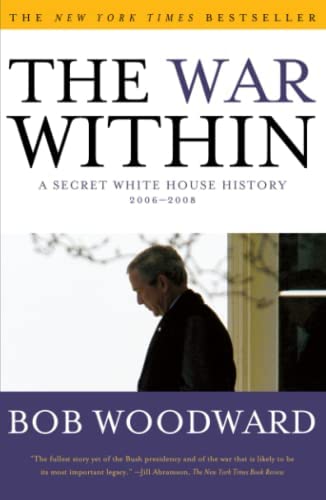Newly released
This book is new and will be uploaded as soon as it becomes available to us and if we secure the necessary publishing rights.

The War Within: A Secret White House History 2006-2008 Book PDF
(0)
Author:
Bob WoodwardNumber Of Reads:
177
Language:
English
Category:
fieldsSection:
Pages:
262
Quality:
excellent
Views:
1389
Quate
Review
Save
Share
Book Description
As violence in Iraq reaches unnerving levels in 2006, a second front in the war rages at the highest levels of the Bush administration. In his fourth book on President George W. Bush, Bob Woodward takes readers deep inside the tensions, secret debates, unofficial backchannels, distrust and determination within the White House, the Pentagon, the State Department, the intelligence agencies and the U.S. military headquarters in Iraq. With unparalled initimacy and detail, this gripping account of a president at war describes a period of distress and uncertainty within the U.S. government from 2006 through mid-2008." Inside cover comments.
"On June 13, 2006, halfway through the sixth year of his presidency and more than three years into the Iraq War, George W. Bush stood on a veranda of the American embassy compound in Baghdad. He had flown through the night for a surprise visit to the new Iraqi prime minister. With so much at stake in Iraq, where success or failure had become the core of his legacy, Bush had been anxious to meet the man he had, in many ways, been waiting for since
the invasion. It was now evening. A hazy sunset had descended over the sweltering, violent capital. The president stepped aside for a private conversation with Army General George W. Casey Jr., the 57 year-old commander of the 150,000 U.S. forces in the country. A 5-foot-8, four-star general with wire-rim glasses, closely cropped graying hair and a soft voice, Casey had been the commander in Iraq for two years. As American military units rotated in and out, rarely serving more than a year, Casey had remained the one constant, seeing it all, trying to understandóand endóthis maddening war in this maddening land. Recently, there had been some positive news in Iraq. A week earlier, U.S. forces had killed Abu Musab al-Zarqawi, the man Osama bin Laden had declared the "Prince of al Qaeda in Iraq" and the terrorist organization's in-country operational commander. And the previous month, after three elections and months of delay, Nouri al-Maliki finally had taken office as the country's first permanent prime minister."
Bob Woodward
Robert Upshur Woodward (born March 26, 1943) is an American investigative journalist. He started working for The Washington Post as a reporter in 1971 and now holds the title of associate editor.While a young reporter for The Washington Post in 1972, Woodward teamed up with Carl Bernstein, and the two did much of the original news reporting on the Watergate scandal. These scandals led to numerous government investigations and the eventual resignation of President Richard Nixon. The work of Woodward and Bernstein was called "maybe the single greatest reporting effort of all time" by longtime journalism figure Gene Roberts.Woodward continued to work for The Washington Post after his reporting on Watergate. He has written 21 books on American politics and current affairs, 13 of which have topped best-seller lists. Woodward was born in Geneva, Illinois, the son of Jane (née Upshur) and Alfred E. Woodward, a lawyer who later became chief judge of the 18th Judicial Circuit Court. He was raised in nearby Wheaton, Illinois, and educated at Wheaton Community High School (WCHS), a public high school in the same town.His parents divorced when he was twelve, and he and his brother and sister were raised by their father, who subsequently remarriedAfter being discharged as a lieutenant in August 1970, Woodward was admitted to Harvard Law School but elected not to attend. Instead, he applied for a job as a reporter for The Washington Post while taking graduate courses in Shakespeare and international relations at George Washington University. Harry M. Rosenfeld, the Post's metropolitan editor, gave him a two-week trial but did not hire him because of his lack of journalistic experience. After a year at the Montgomery Sentinel, a weekly newspaper in the Washington, D.C., suburbs, Woodward was hired as a Post reporter in 1971.
Book Currently Unavailable
This book is currently unavailable for publication. We obtained it under a Creative Commons license, but the author or publisher has not granted permission to publish it.
Rate Now
5 Stars
4 Stars
3 Stars
2 Stars
1 Stars
The War Within: A Secret White House History 2006-2008 Quotes
Top Rated
Latest
Quate
Be the first to leave a quote and earn 10 points
instead of 3
Comments
Be the first to leave a comment and earn 5 points
instead of 3